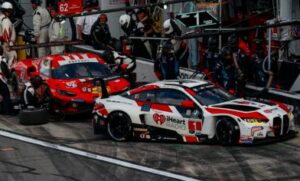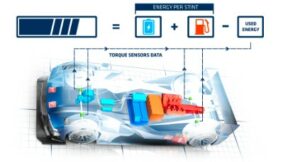
Motorsports have long been associated with the roar of engines and the scent of burning fuel. However, a paradigm shift is underway as the world embraces the need for sustainability. Clean energy in motorsports is no longer a futuristic concept but a tangible reality, revolutionizing the way races are conducted and setting a new standard for environmental responsibility.

The Drive Towards Sustainability
Green Initiatives in Motorsports
Motorsports organizations globally are recognizing the urgent need to address environmental concerns. From Formula 1 to electric racing series like Formula E, the industry is pivoting towards sustainable practices. Initiatives focus on reducing carbon footprints, minimizing waste, and embracing technologies that align with a cleaner, greener future.
Electric Racing Series: A Pioneering Force
Electric racing series have emerged as trailblazers in the realm of clean energy in motorsports. Formula E, launched in 2014, stands out as a prime example. The series exclusively features electric cars, showcasing the potential of renewable energy sources and challenging traditional perceptions of racing.
Clean Energy Technologies in Motorsports
Electric Vehicles (EVs) in Racing
Electric vehicles (EVs) are at the forefront of the clean energy revolution in motorsports. These high-performance machines demonstrate that speed and sustainability can go hand in hand. Major racing events, including the prestigious Le Mans 24 Hours, now feature electric or hybrid categories, pushing the boundaries of what clean energy can achieve on the track.
Hydrogen-Powered Racing
Hydrogen fuel cell technology is gaining traction as a viable alternative in motorsports. Hydrogen-powered race cars emit only water vapor, offering a zero-emission solution. Initiatives like the Hydrogen Energy Supply Chain (HESC) are exploring the potential of hydrogen as a clean energy source for motorsports, signaling a promising future.
Biofuels: Racing with Renewable Resources
Biofuels derived from organic matter are making their mark in motorsports. Blending traditional racing fuels with biofuels reduces greenhouse gas emissions and lessens the sport’s reliance on finite fossil fuels. Racing series are increasingly adopting biofuels, emphasizing the importance of sustainable alternatives.
Thunderbird Speedway: A Local Commitment to Clean Racing
Integrating Clean Energy Practices
Even at the local level, venues like Thunderbird Speedway are acknowledging the significance of embracing clean energy practices. Implementing solar panels to power facilities, utilizing energy-efficient lighting, and promoting eco-friendly transportation options are steps that reflect the speedway’s commitment to a sustainable future.
Community Engagement and Education
Thunderbird Speedway recognizes the role it plays in influencing the local community. By actively engaging with fans and educating them about clean energy initiatives, the speedway not only fosters environmental consciousness but also inspires individuals to consider sustainability in their own lives.
Challenges and Innovations
Overcoming Range Limitations
While strides have been made in clean energy technologies, challenges persist. Electric vehicles face range limitations, requiring innovative solutions for longer races. Advances in battery technology and charging infrastructure are essential to overcoming this hurdle and making clean energy more viable for extended competitions.
Balancing Performance and Sustainability
Motorsports thrive on speed and performance, and transitioning to clean energy must not compromise these aspects. Engineers and designers are tasked with finding the delicate balance between achieving top speeds and ensuring that the environmental impact remains minimal. This challenge spurs innovation within the industry.
The Economic Case for Clean Energy in Motorsports
Attracting Sustainable Sponsorship
Clean energy initiatives in motorsports are not only environmentally responsible but also economically viable. Sponsors and partners increasingly seek associations with eco-friendly practices. Motorsports entities embracing clean energy open doors to a new wave of sponsorship opportunities, creating a positive cycle of support for sustainability.
Cost Reduction through Innovation
Contrary to the perception that clean energy technologies are cost-prohibitive, embracing sustainability in motorsports can lead to long-term cost reductions. Innovations in energy-efficient components, recyclable materials, and streamlined manufacturing processes contribute to a more economically sustainable model for the industry.
The Road Ahead: A Greener Racetrack
Global Collaboration for Sustainable Racing
The shift towards clean energy in motorsports is a global endeavor. Collaborative efforts between racing organizations, technology developers, and policymakers play a crucial role in setting and achieving sustainability goals. The sharing of best practices and the establishment of industry standards propel the entire motorsports ecosystem towards a greener future.
Inspiring the Next Generation
Clean energy initiatives in motorsports go beyond the track; they inspire future generations. Young engineers, drivers, and enthusiasts witnessing the marriage of speed and sustainability are more likely to champion eco-friendly technologies in their careers. This ripple effect ensures that the commitment to clean energy endures.
Conclusion: Accelerating Towards a Sustainable Future
As motorsports navigate the turns towards a cleaner future, the integration of clean energy technologies becomes not just an option but a necessity. Thunderbird Speedway’s local commitment, coupled with global initiatives like Formula E, paints a picture of an industry in transformation. The roar of engines is gradually accompanied by the hum of electric motors and the whispers of sustainable innovation. Clean energy in motorsports is not just a race—it’s a journey towards a greener racetrack and a brighter, more sustainable future for the entire industry.






